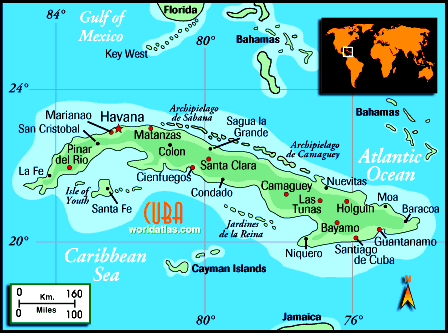

A "Cuban" American explains Why "non-Cuban" Americans do not support the "Cuban" Americans
By Agustín Blázquez


A "Cuban" American explains Why "non-Cuban" Americans do not support the "Cuban" Americans
By Agustín Blázquez
The Cuban exiles living in the U.S. for 41 years have not learned much. The constant display of Cuban flags, signs and chanting in Spanish
at demonstrations, excludes the American people who could be, and should be, our ally. The anti-Castro stand, rather than pro-democracy
or pro-freedom, separates us from the rest of America.
I have noticed lately that average Americans are speaking out and strongly resent this attitude. If we want to communicate with the great
majority in this country, especially since we are surrounded by a highly hostile press, we have to do it in ENGLISH.
Americans do not understand what we mean when we carry Cuban flags at a demonstration in the U.S. Are we anti-American? Are we
pro-Cuba?
NO MORE SIGNS AND CHANTING IN SPANISH IF WE WANT TO COMMUNICATE OUR MESSAGE! Say "Freedom!" instead of
"Libertad!" It is not that difficult. The CUBAN FLAG and the singing of the CUBAN NATIONAL ANTHEM is NOT helping us a bit. Learn the
AMERICAN NATIONAL ANTHEM if you do not know it. It is a joy to sing, and it is beautiful. We need a 180 degree turn in an effort to
reach America, the country where we live. Listen to Americans who want to help us and join in our effort to give liberty to Elián.
What "Mothers Against Repression" are doing by staging silent dignified demonstrations dressed all in black is good and non-threatening
to Americans. But please, carry the AMERICAN FLAG. You are in America so behave like one.
They don't look like people who are proud to be Americans. As an American, why should I want to support someone who doesn't appear to
be in support of the US?
An American Explains Why Most Americans Are Not On the Side of "Cuban" Americans
By Jaums Sutton.
I write this as a born-in-the-US American who has a familiarity with the situation with Cuba because I have many Cuban Americans as
friends for many years. All of what I have to say is in my reaction to what I see in the media compared to my beliefs, developed mostly
through my friendships. I mean to be constructive and supportive.
An article in the Washington Post, Elian Impasse Widens Miami's Ethnic Divides, by April Witt; Page A1,
If Cuban Americans want the US behind them, they must reach out to the Americans in terms that Americans understand. If the American
people are behind them, then most of the politicians will have no choice but to be behind them. The media (OK, at least most of the media)
will have no choice either. And so on.
But how do you get the American people behind you? Reach out to them at every opportunity in their language. Perhaps the most
persuasive way is through TV. When I see protesters on TV in Miami or in Bethesda, where Juan Miguel is being held, I see a lot of posters
in Spanish. I see a lot of Cuban flags. As an American, I do not see someone who is reaching out to me. I see Cubans who want to reach
other Cubans. If the goal is to get the US behind you on the issue of Elian, for example, then you need to reach out to Americans, not to
Juan Miguel, not to the family in Miami nor to each other. Juan Miguel can't see the sign from so far away and through the trees and
closed blinds, anyway. And on TV you can be sure he won't see it either, because his handlers are not letting him watch live TV, but tapes
of the things they want him to see. The family in Miami already agrees with you, so they don't need to see the signs. And, as for each
other, you already know the story.
Seeing signs in Spanish and Cuban flags makes me, as an American, wonder if the Cubans in Miami want to pretend they are in Cuba. They
don't look like people who are proud to be Americans. As an American, why should I want to support someone who doesn't appear to be in
support of the US? I realize that they may very well be in support of the US, but that is not the impression they are giving.
Historically, we have welcomed immigrants here and I think we should continue to do so. But, if the immigrants are proudly waving a
"foreign" flag and holding up signs in a "foreign" language, I don't feel they are asking for my concern or my support. The impression given
off is that they seem to be ignoring the fact that they are in the US. Reach out to the ones who can help you. Make us feel that we are all
in this together. Americans like to help other Americans, no matter where they were born.
(http://www.washingtonpost.com/wp-dyn/articles/A219902000Apr15.html) talks about the fact that many Cuban Americans do not
understand why so many Americans are not on their side.
